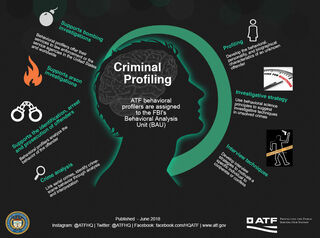Forensic Psychology
Skeptical of FBI Criminal Profiling’s Validity?
There are alternative profiling approaches.
Posted September 27, 2020

Not everyone believes in the FBI criminal profiling process that has been popularly depicted in the hit Netflix series Mindhunter.
For several decades now, clinical and forensic psychologists have been conducting research in order to assess the scientific rigor and validity of criminal profiling techniques. In that regard, a number of experiments have been conducted by psychologists on the central assumptions and techniques of FBI criminal profiling, but these studies have usually involved recreations in a controlled setting and were not based on actual criminal cases. Moreover, many of these studies have never been replicated, so their reliability is questionable or unknown.
Despite an inability to conduct utility tests on actual serial homicide cases, several prominent psychologists who oppose the FBI system have nonetheless developed new approaches to profiling which they claim outperform the FBI process. At least two of these newer approaches have gained acceptance among criminal justice practitioners over the past few decades. They are as follows.
Investigative Psychology and Offender Profiling
This approach is based on the work of applied psychologist David Canter, Ph.D., who pioneered the field of investigative psychology in the early 1990s. He founded the Centre for Investigative Psychology at the University of Liverpool in England. Investigative psychology, according to Dr. Canter, includes many areas where psychology can contribute to criminal investigations, including behavioral profiling.
The goal of offender profiling, as performed by investigative psychologists, is similar to the goal of the FBI system of profiling—that is, to infer the defining characteristics of an unknown suspect based on his/her behavior during the commission of a crime. The difference between the two systems, according to Canter, is that all of the inferences made by investigative psychologists are based on empirical, peer-reviewed research, as opposed to the FBI model where inferences are based on the anecdotal experiences of individual criminal investigators.
Canter and his colleagues analyzed crime scene data from 100 serial homicide cases they found in the Centre for Investigative Psychology database to test the FBI's organized/disorganized dichotomy of serial crimes.
Their findings indicate that, contrary to the assertions of FBI profilers, virtually all serial murderers in their study exhibited some level of organization. Canter contends that organized behaviors such as concealing the victim's body are “constants“ of serial homicide that tend to occur along with variables such as mutilation or necrophilia.
Canter and his colleagues concluded that the actual difference between serial murderers lies in the type of “disorganized behaviors they exhibit” rather than the organized/disorganized dichotomy adhered to by the FBI. They further concluded that serial murderers can be divided into categories based on their interactions with their victims, including sexual control and domination, mutilation, or torture.
Canter argues that empirical research studies performed by investigative psychologists, based on proven scientific methods, are the only way to establish valid and reliable descriptions, categories, and classifications of serial killers. The approach utilized by investigative psychologists, according to Canter, "considers all the information that may be apparent at the crime scene and to carry out theory-based studies to determine the underlying structures of that material" (1).
Canter and his colleagues have little faith in the serial offender descriptions and categories developed by FBI agents from their own personal crime scene investigations. Canter believes that investigative psychologists must work from the ground up to gather data, develop theories, and classify offenders using empirical research methods that are not limited or biased by the experiences of criminal investigators.
Forensic Psychology and Crime Action Profiling
In the late 1990s, forensic psychologist Richard Kocsis, Ph.D., sought to construct criminal profiles for serial crimes that are not readily solved through conventional police investigative methods. Dr. Kocsis and his colleagues developed highly regarded profiling models based on large-scale analyses of serial murder, rape, and arson. Their system which is known as Crime Action Profiling (CAP) came into being as a result of a massive research study funded by the Australian government.
It was developed by Kocsis in collaboration with law enforcement agencies in that country. Their approach is distinctly different than the FBI system. The models developed by Kocsis and his associates are similar in design to in-depth structured interviews that clinical psychologists use to make diagnoses of their patients (2).
Kocsis, who is now in private practice, says that crime action profiling models are rooted in practical knowledge developed by forensic psychologists, psychiatrists, and criminologists. CAP models provide demographic, geographic, and psychographic measures or predictors of unknown subjects. He contends that a vital part of every crime action profile is an examination of the process of behavioral profiling itself. Kocsis says:
What seems to have been overlooked is any systematic examination of how to compose a profile. What type of information… should profiles contain? What type of case material do you need [in order] to construct a profile? How does the presence or absence of [case] material affect the accuracy of a profile? (3).
Kocsis and his colleagues in forensic psychology believe that the future of behavioral profiling lies in more empirically-based scientific research, similar to the beliefs of Canter and investigative psychologists. He believes that profiling is an acquired skill and that levels of ability vary greatly among practitioners. Just as some clinical psychologists are better therapists than others, some forensic psychologists are better practitioners of CAP than others. Kocsis readily admits that CAP is not an exact science.
When asked by the APA Monitor on Psychology whether the practice of profiling is more of an art or a science, Kocsis said, “Realistically, I think it is probably a bit of both." Nevertheless, his CAP system has received acceptance among forensic psychologists, criminologists, and profilers around the world.
Follow me @DocBonn on Twitter and visit my website at docbonn.com.
References
1. Canter, D.V., Alison, L.J., Alison, E. and Wentink, N. 2004. “The organized/disorganized typology of serial murder: Myth or model? Psychology, Public Policy and Law, 10 (3), pp. 293-320.
2. Kocsis, R.N. 2006. Criminal Profiling: Principles and Practice. Totowa, NJ: Humana Press.
3. Winerman, L. 2004. “Criminal profiling: The reality behind the myth.” Monitor on Psychology, 35 (7), p. 68.




